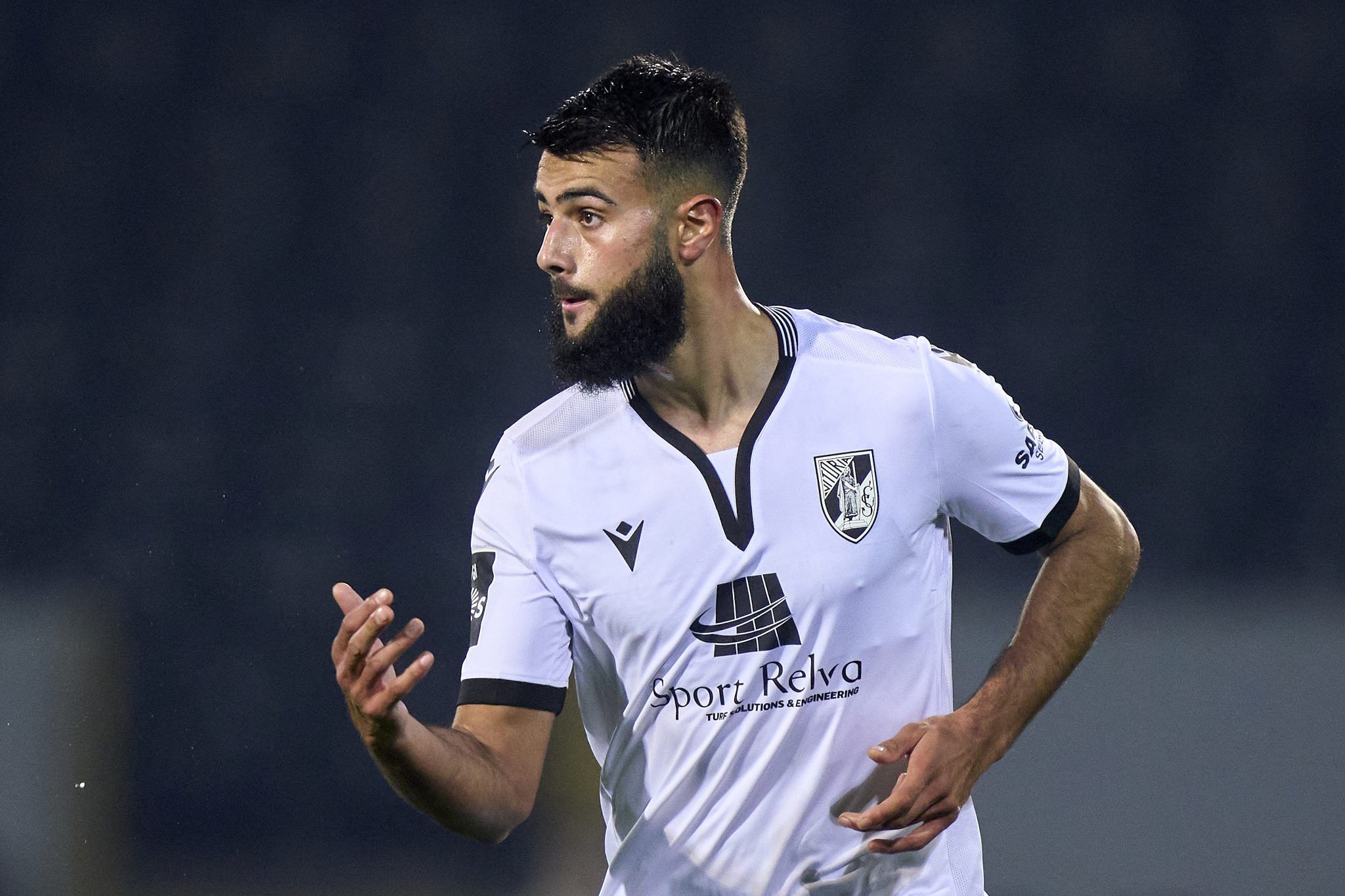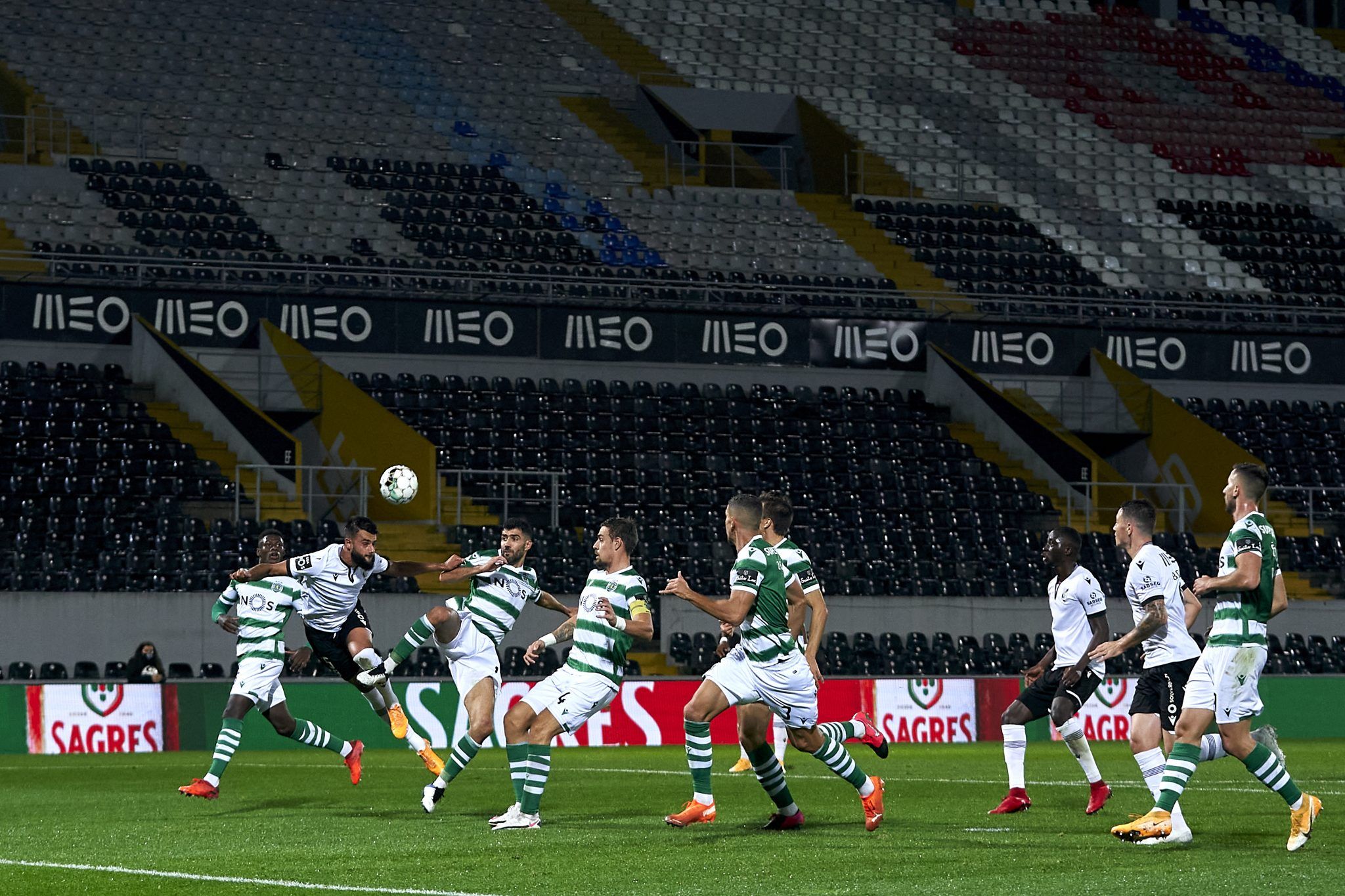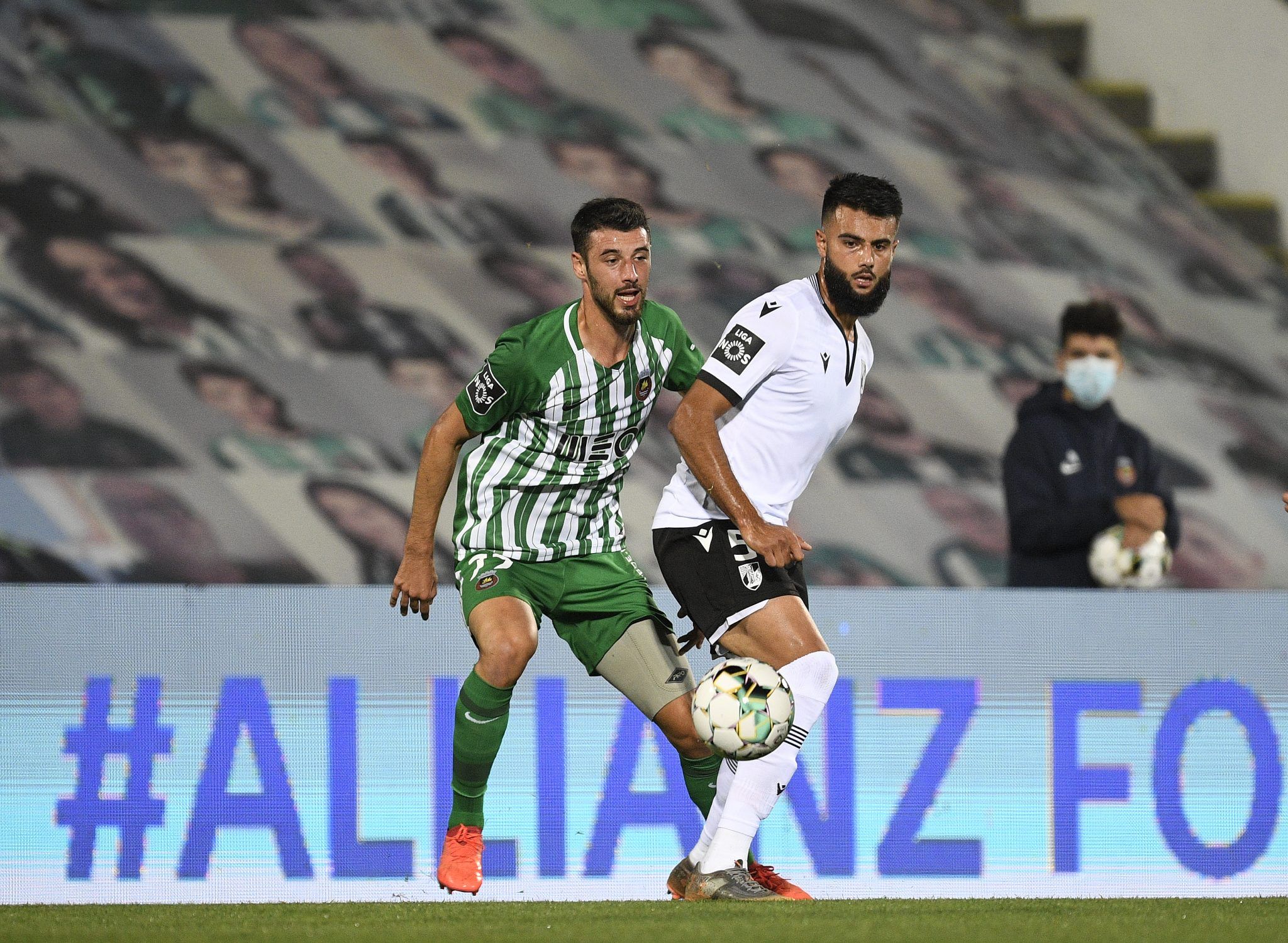

Share
26th January 2021
02:40pm GMT

 Suliman signed a four-and-a-half-year deal with Vitória de Guimarães in January 2020, when Europe was still to be troubled by Covid-19. He speaks to JOE from his apartment, tucked away in a quiet city suburb, 15 minutes' drive from the club's training facilities.
"It's nice and peaceful here," he says with a smile. "It's not what I'm used to back home, but it's a good thing. I'm growing used to it."
His move to Portugal happened quickly. Fast approaching his 22nd birthday, a desire to secure regular first team appearances saw him end his 14-year association with Aston Villa, joining a growing number of promising young English footballers willing to try their luck overseas.
Suliman had been highly regarded as he progressed through Villa's youth ranks, his reputation growing steadily as he captained England across several age groups and attracting interest from Bayern Munich when he was 16. After helping England's Under-19s to European Championship glory in 2017 - scoring a header in the final - he had been tipped by many to eventually establish himself in Villa's first team.
Suliman signed a four-and-a-half-year deal with Vitória de Guimarães in January 2020, when Europe was still to be troubled by Covid-19. He speaks to JOE from his apartment, tucked away in a quiet city suburb, 15 minutes' drive from the club's training facilities.
"It's nice and peaceful here," he says with a smile. "It's not what I'm used to back home, but it's a good thing. I'm growing used to it."
His move to Portugal happened quickly. Fast approaching his 22nd birthday, a desire to secure regular first team appearances saw him end his 14-year association with Aston Villa, joining a growing number of promising young English footballers willing to try their luck overseas.
Suliman had been highly regarded as he progressed through Villa's youth ranks, his reputation growing steadily as he captained England across several age groups and attracting interest from Bayern Munich when he was 16. After helping England's Under-19s to European Championship glory in 2017 - scoring a header in the final - he had been tipped by many to eventually establish himself in Villa's first team.
 By late 2019, however, Suliman was faced with the stark reality that his future lay away from Villa Park. After a loan move to Dutch side FC Emmen had failed to provide the first team opportunities he craved, his football had been limited to Villa's Under-23s. With a solitary senior appearance to his name at Villa - as a substitute in a Carabao Cup tie in 2017 - it was time to move on.
By late 2019, however, Suliman was faced with the stark reality that his future lay away from Villa Park. After a loan move to Dutch side FC Emmen had failed to provide the first team opportunities he craved, his football had been limited to Villa's Under-23s. With a solitary senior appearance to his name at Villa - as a substitute in a Carabao Cup tie in 2017 - it was time to move on.
"It's a difficult decision when you've been there that long, but I'm not bitter," he says. "I had to be realistic and at the time, Villa were spending a lot of money and had top quality centre-halves. I had to find the right club, the right next step. When I knew coming here was an option, I was excited. I knew it was what I wanted to do."
Leaving the familiarity of home for an entirely different country at such short notice would represent a challenge for any young person and Suliman openly admits that the prospect of adapting to his new life was daunting. Football demands aside, he didn't speak a word of Portuguese when he arrived and had never set foot in Guimarães before. Added to this, for the first time in his life, he was living alone, learning to prepare food and wash and iron his clothes on a regular basis. "It was a lot to take in during those first few weeks," he says. "I didn't play much after I first made the move, but I knew I had to show people I was serious about succeeding here. The language is a good starting point. I'm not fluent yet but I made sure I picked up a few words straight away. It's important to do that, to show you want to fit in. It shows you’re trying." He didn't stop there. Suliman also made a conscious effort to learn more about his new surroundings, exploring the city and finding out about its landmarks during his free time.
"It’s only a small city but there’s a lot here," he says. "It's quite a historic place and the people are really proud of that. I felt that, like learning the language, teaching myself more about the city would show people I was serious about making this work."
Then, with his debut approaching, the world changed. As the gravity of the situation dawned on football authorities across the continent, the Portuguese FA opted to play games behind closed doors. A matter of hours later they revised this decision after an emergency meeting, announcing an indefinite suspension. Having paid close attention to the developments for the days leading up to this point, it came as no surprise to Suliman.
He didn't stop there. Suliman also made a conscious effort to learn more about his new surroundings, exploring the city and finding out about its landmarks during his free time.
"It’s only a small city but there’s a lot here," he says. "It's quite a historic place and the people are really proud of that. I felt that, like learning the language, teaching myself more about the city would show people I was serious about making this work."
Then, with his debut approaching, the world changed. As the gravity of the situation dawned on football authorities across the continent, the Portuguese FA opted to play games behind closed doors. A matter of hours later they revised this decision after an emergency meeting, announcing an indefinite suspension. Having paid close attention to the developments for the days leading up to this point, it came as no surprise to Suliman.
"Keeping focus was really tough before the suspension was announced. We were all trying to prepare for the game we had on the Saturday but with all this going on in the background, that was difficult."
Any relief he experienced at the decision was quickly replaced by a fear that he would have to spend an unspecified period of time alone in his apartment, his only company the news channels he had been glued to in the days leading up to this point. Thankfully, Vitória acted quickly, granting their players permission to travel home until it was deemed safe enough for football to return. A flight from Porto airport was hastily arranged, and Suliman spent a month back in Birmingham, leaving the family home only to complete his daily fitness training. "I was fortunate," he says. "I know players who had to stay at their clubs in the Netherlands and couldn't do anything for weeks. I don’t know how my mental state would have been if I had to stay here on my own. I’m grateful the club saw this coming and reacted."It was obviously a worrying time for everyone but getting back took a lot of that worry away. I wasn’t seeing all my family, which is unusual for an Asian family like ours, but being home helped. The TV didn’t go on once and I loved it."
 Since returning to Portugal, things have been better. He finally made his debut as a sub in a league game against Sporting Lisbon in June and was handed a run of starts as Vitória concluded the season with a seventh-place finish. He has built on this run of appearances during the new campaign, feeling increasingly at home at the club and enjoying the chance to play and train alongside Ricardo Quaresma, a summer arrival.
"I remember watching him when I was younger, doing the outside of the boot shots and crosses," he smiles. "It was a surreal moment coming into training and seeing him with us.
"People might think because of his age he’s coming to the end of his career but he’s not missed a training session or game all season. His attitude is phenomenal. He arrives early to train, stays late after it. When you see that and you know what he’s achieved, you can only learn good things. He’s a winner."
Adapting to life abroad is rarely a straightforward process for a young footballer, particularly so this year with the added complications posed by the pandemic. Suliman, though, refuses to dwell on the negatives and is grateful for the support he has received. As well as help from family and his club, through the PFA he has also been in regular contact with former Fulham defender Zesh Rehman. Growing up in a similar area of Birmingham, Rehman spent a large chunk of his professional career playing abroad and has therefore been able to offer plenty of useful advice on how to adapt to his new home over the course of the last year.
Suliman firmly believes the experience has strengthened and developed him as a person. His time back in the UK was put to good use as he continued to learn Portuguese, reaching a level where he is able to hold conversations with teammates. Time alone in his apartment is no longer quite so daunting, either. He has found a local halal meat supplier for his home cooking, mastered the washing and ironing of his clothes and also developed an enjoyment of reading, having just started Relentless by revered NBA coach, Tim Grover.
Since returning to Portugal, things have been better. He finally made his debut as a sub in a league game against Sporting Lisbon in June and was handed a run of starts as Vitória concluded the season with a seventh-place finish. He has built on this run of appearances during the new campaign, feeling increasingly at home at the club and enjoying the chance to play and train alongside Ricardo Quaresma, a summer arrival.
"I remember watching him when I was younger, doing the outside of the boot shots and crosses," he smiles. "It was a surreal moment coming into training and seeing him with us.
"People might think because of his age he’s coming to the end of his career but he’s not missed a training session or game all season. His attitude is phenomenal. He arrives early to train, stays late after it. When you see that and you know what he’s achieved, you can only learn good things. He’s a winner."
Adapting to life abroad is rarely a straightforward process for a young footballer, particularly so this year with the added complications posed by the pandemic. Suliman, though, refuses to dwell on the negatives and is grateful for the support he has received. As well as help from family and his club, through the PFA he has also been in regular contact with former Fulham defender Zesh Rehman. Growing up in a similar area of Birmingham, Rehman spent a large chunk of his professional career playing abroad and has therefore been able to offer plenty of useful advice on how to adapt to his new home over the course of the last year.
Suliman firmly believes the experience has strengthened and developed him as a person. His time back in the UK was put to good use as he continued to learn Portuguese, reaching a level where he is able to hold conversations with teammates. Time alone in his apartment is no longer quite so daunting, either. He has found a local halal meat supplier for his home cooking, mastered the washing and ironing of his clothes and also developed an enjoyment of reading, having just started Relentless by revered NBA coach, Tim Grover.
 "It's given me the chance to find ways of relaxing when I am on my own," he says. "I've enjoyed the reading. It's something I didn't always get the chance to do but I find it calming.
"This move, this experience, has helped me better myself. It’s given me that focus to improve, whether that’s mentally or physically or with other things. I think I've grown as a person, even through all that's happened. I’m learning a new language, I'm doing things I didn’t do before."
There is still much to look forward to for Suliman. He relishes the opportunity of playing his first game in front of Vitória's home support, regarded as one of the most passionate fanbases in the country. He also looks forward to the day his family, especially his dad, Zaheer, can travel to Portugal to see him in action for his new club.
"That will be a special day," he says. "I've never regretted the decision to come here but after all that's happened, I really look forward to that."
"It's given me the chance to find ways of relaxing when I am on my own," he says. "I've enjoyed the reading. It's something I didn't always get the chance to do but I find it calming.
"This move, this experience, has helped me better myself. It’s given me that focus to improve, whether that’s mentally or physically or with other things. I think I've grown as a person, even through all that's happened. I’m learning a new language, I'm doing things I didn’t do before."
There is still much to look forward to for Suliman. He relishes the opportunity of playing his first game in front of Vitória's home support, regarded as one of the most passionate fanbases in the country. He also looks forward to the day his family, especially his dad, Zaheer, can travel to Portugal to see him in action for his new club.
"That will be a special day," he says. "I've never regretted the decision to come here but after all that's happened, I really look forward to that."Explore more on these topics: